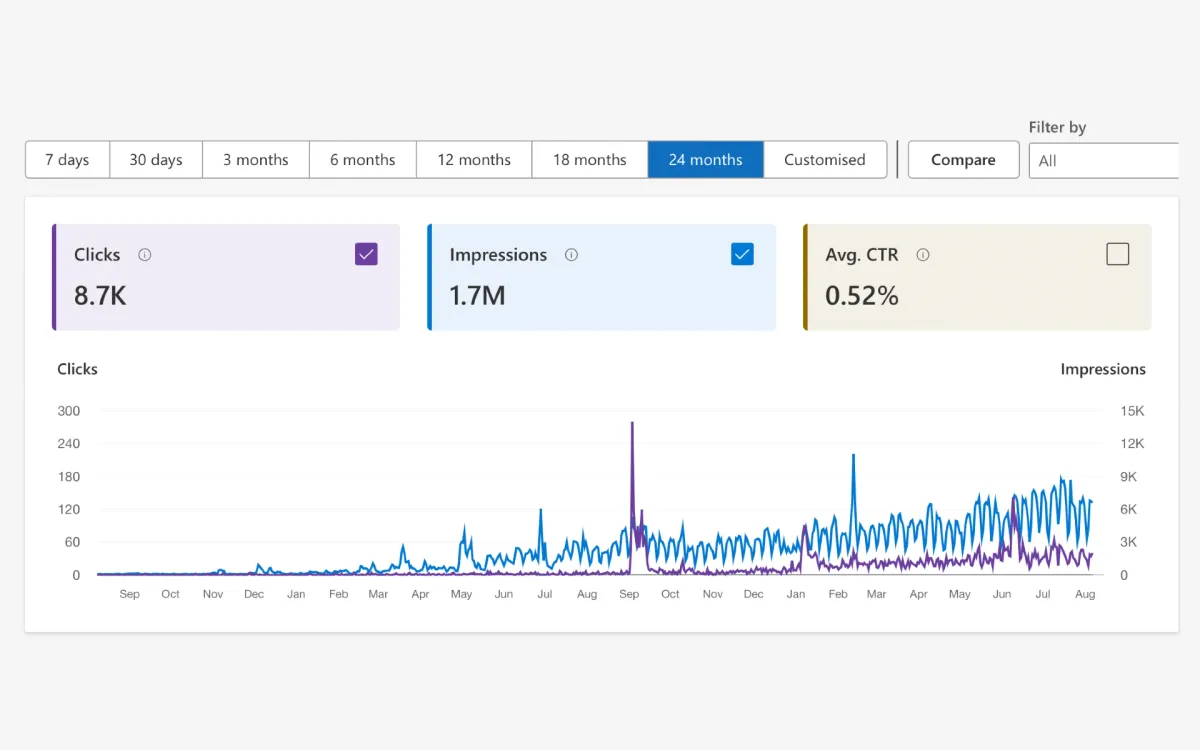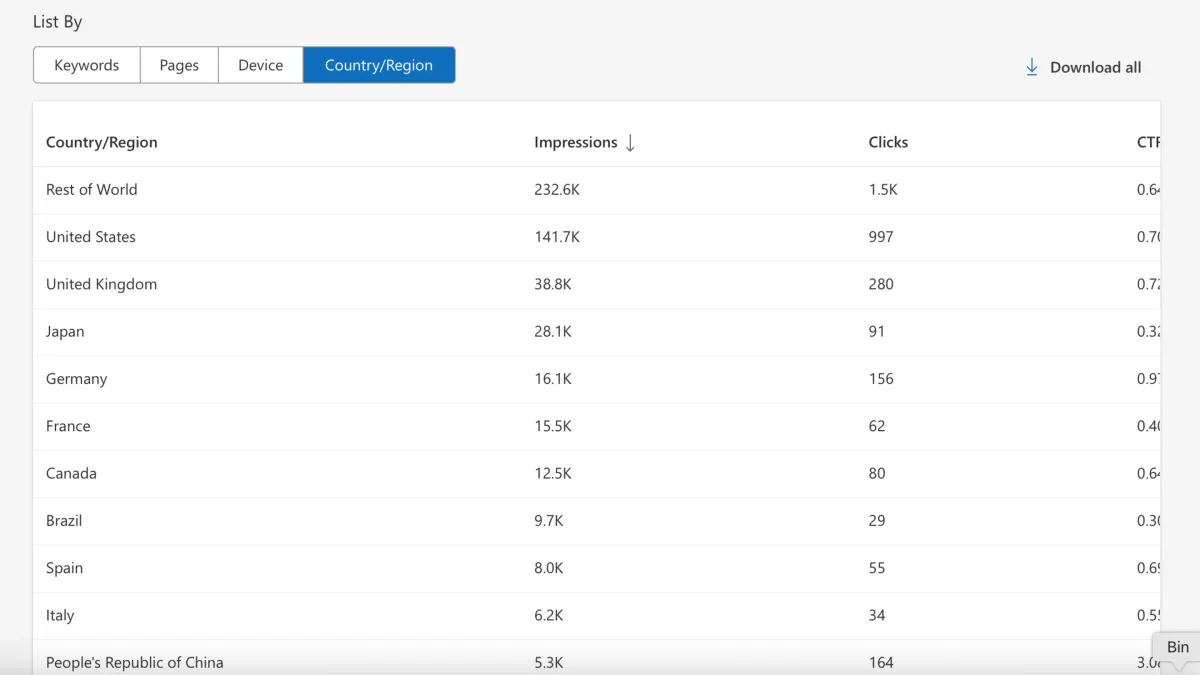
Microsoft has significantly expanded the data capabilities within Bing Webmaster Tools, extending historical search performance data from 16 months to 24 months while introducing new device and country filtering options. The announcement came through Krishna Madhavan, Principal Product Manager at Microsoft AI, Bing, on August 8, 2025, marking a substantial upgrade to the platform's analytical capabilities.
The enhancement represents a 50% increase in historical data availability compared to the previous 16-month retention period that Microsoft implemented in October 2024. According to Madhavan's LinkedIn announcement, webmasters now gain "deeper visibility into your site's performance over time" through three key improvements: expanded historical data, new country and device filters, and enhanced keyword trendlines.
The timing coincides with Microsoft's broader strategy to enhance Bing Webmaster Tools' competitive position against Google Search Console. Barry Schwartz from Search Engine Roundtable first reported the device and country filtering additions on August 7, 2025, though Microsoft had not yet confirmed the full scope of the update until Madhavan's official announcement.
Subscribe the PPC Land newsletter ✉️ for similar stories like this one. Receive the news every day in your inbox. Free of ads. 10 USD per year.
Technical implementation details
The expanded historical data provides webmasters with 24 months of search performance metrics, enabling more comprehensive long-term trend analysis. This data includes impressions, clicks, click-through rates, and average position metrics across all Search Performance filtering categories. Microsoft ensures immediate availability of the full 24-month dataset for existing accounts, though crawling and indexing history accumulates gradually over time.
The new device filtering system segments performance data by desktop, mobile, and tablet traffic. This granular breakdown addresses mobile-first optimization requirements as search behavior continues shifting toward mobile devices across Bing's user base. Screenshots from the platform show comprehensive analytics tables displaying device-specific metrics alongside existing reporting capabilities.
Country filtering provides geographical distribution analysis of search impressions and clicks. Sample data reveals significant performance variations across regions, with "Rest of World" generating 11.6 million impressions and 3,200 clicks, while the United States accounts for 7.7 million impressions and 2,000 clicks. The United Kingdom follows with 2.5 million impressions and 508 clicks, demonstrating clear geographical performance patterns.
Additional countries appearing in breakdown data include Canada with 812,500 impressions and 120 clicks, Germany showing 133,300 impressions with 63 clicks, and Brazil recording 127,900 impressions alongside 43 clicks. France, Italy, Spain, and Japan also feature in the geographical analysis with varying performance metrics.
 PPC LandLuis Rijo
PPC LandLuis Rijo
Interface integration and accessibility
The new filtering options integrate seamlessly into the existing Search Performance interface through dropdown menus alongside established keyword and page filtering options. Microsoft maintains design consistency with current Bing Webmaster Tools standards while ensuring data export functionality remains available across all filtering categories, supporting CSV downloads for external analysis.
Users can access device-specific insights through dedicated dropdown selections, while country breakdowns appear in comprehensive tables showing impressions and clicks data segmented by geographical regions. The interface supports pagination for large datasets, displaying up to 25 rows per page with navigation controls to accommodate websites with extensive international presence or diverse device audiences.
Performance metrics include standard Bing Webmaster Tools measurements across all new filtering options. The system applies filtering consistently across impressions, clicks, click-through rates, and average positions, ensuring comprehensive analysis capabilities. Users can combine multiple filters for specific data segments, enabling targeted analysis of particular device types within specific geographical markets.
Marketing and competitive implications
The enhanced data capabilities address critical gaps in search performance analysis for digital marketing teams. Device breakdowns enable mobile-first optimization strategies, crucial as mobile search continues growing across Bing's ecosystem. Country-specific data supports international SEO campaigns and localization efforts by providing clear performance attribution across different markets.
For PPC professionals, the improved data correlation between organic and paid search performance becomes more precise with extended historical views and granular segmentation. Understanding device and geographical performance patterns helps optimize advertising spend and target selection. The expanded dataset supports better attribution modeling across marketing channels while facilitating competitive analysis through clearer performance benchmarking.
E-commerce platforms particularly benefit from country-specific insights, enabling region-tailored product strategies and inventory planning. The device breakdown supports responsive design optimization and mobile commerce improvements, directly impacting conversion rates and user experience metrics. The 24-month historical view enables seasonal pattern recognition and long-term trend identification previously impossible with shorter data retention periods.
SEO agencies can now deliver more detailed reporting to clients, demonstrating value through comprehensive performance tracking across extended timeframes. The granular data supports targeted content strategy development, revealing regional content preferences and optimization requirements that inform editorial planning and investment decisions.
Industry context and competitive positioning
The update arrives during heightened competition in the search engine optimization tools market. Microsoft's aggressive enhancement of Bing Webmaster Tools follows several major improvements throughout 2024 and 2025. The company extended data retention from 6 months to 16 months in October 2024, responding to user feedback about limitations in long-term trend analysis.
Microsoft also launched the Recommendations feature in October 2024, replacing the previous Insights tool with more comprehensive optimization guidance. These developments demonstrate Microsoft's commitment to competing more effectively with Google Search Console's analytical capabilities while positioning Bing Webmaster Tools as a comprehensive alternative.
The company has been particularly focused on AI integration, with Copilot functionality entering limited preview to provide real-time assistance for SEO optimization tasks. These improvements collectively strengthen Bing Webmaster Tools' value proposition for SEO professionals seeking alternatives to Google's offerings.
Krishna Madhavan emphasized in his announcement that the updates provide "more data and transparency for webmasters" while encouraging users to "turn fresh insights into forward strategy." This messaging aligns with Microsoft's broader push to enhance Bing's market position amid increased competition from AI-powered search tools and evolving user expectations.
Data analysis and optimization capabilities
The extended 24-month historical view enables more sophisticated seasonal pattern recognition and trend analysis. Webmasters can now identify yearly fluctuations in traffic and search visibility that shorter data retention periods previously obscured. This capability proves particularly valuable for businesses with seasonal products or services requiring long-term optimization planning.
International SEO campaigns benefit from clearer performance attribution across different countries through the new geographical filtering. This data helps prioritize market expansion efforts and allocate resources toward highest-performing regions. The insights complement existing keyword and page performance analysis for comprehensive optimization planning while supporting content localization decisions.
Technical SEO improvements become more targeted with device-specific data revealing mobile optimization opportunities often masked in aggregate reporting. Mobile crawling issues, page speed problems, and responsive design failures become easier to identify and address through dedicated device performance analysis. The country breakdown assists with CDN optimization and server location planning for international audiences.
Content strategy development gains precision through geographical performance insights revealing regional content preferences and cultural adaptation requirements. The extended historical data supports editorial planning by identifying long-term content performance patterns and investment opportunities across different markets and device types.
Implementation and rollout approach
Microsoft continues its pattern of gradual feature releases without major announcement campaigns. The quiet rollout mirrors previous Bing Webmaster Tools updates that emerged through user discovery rather than official communications. Frank Sandtmann, an SEO professional, first noticed the device and country filtering options on August 7, 2025, sharing the discovery on Mastodon before widespread recognition.
Barry Schwartz noted reaching out to Microsoft for confirmation but received no immediate response regarding the initial filtering updates. The functionality appears stable across multiple user accounts, indicating a completed rollout rather than limited testing. Madhavan's LinkedIn announcement on August 8, 2025, provided the first official confirmation of the expanded capabilities.
The timing aligns with Microsoft's broader strategy to enhance Bing's competitive position through incremental improvements that maintain feature parity with competitor platforms while adding unique value propositions. These updates demonstrate Microsoft's responsiveness to user feedback and commitment to supporting SEO professionals with advanced analytical tools.
Future implications and strategic direction
The enhanced capabilities signal Microsoft's long-term commitment to the webmaster tools market. By extending historical data retention and adding granular filtering options, Microsoft addresses fundamental limitations that previously hindered comprehensive SEO analysis. These improvements position Bing Webmaster Tools as a viable alternative for organizations seeking alternatives to Google Search Console.
The focus on device and geographical filtering reflects broader industry trends toward mobile-first optimization and international expansion. As businesses increasingly operate across multiple markets and device types, the demand for granular performance analysis continues growing. Microsoft's proactive approach to these requirements strengthens its competitive position.
The integration of these features with existing AI-powered tools like Copilot suggests future enhancements may leverage machine learning for predictive analytics and automated optimization recommendations. The expanded dataset provides the foundation for more sophisticated analytical capabilities that could differentiate Bing Webmaster Tools from competitor offerings.
SEO professionals and webmasters can expect continued improvements as Microsoft responds to user feedback and competitive pressures. The company's willingness to extend data retention and add filtering capabilities indicates openness to further enhancements based on community needs and industry requirements.
Timeline
August 7, 2025 - Frank Sandtmann discovers new device and country filtering options in Bing Webmaster Tools
August 7, 2025 - Barry Schwartz reports the discovery on Search Engine Roundtable
August 8, 2025 - Krishna Madhavan officially announces 24-month data expansion and confirms new filtering capabilities on LinkedIn
October 16, 2024 - Microsoft extends Bing Webmaster Tools Search Performance data retention to 16 months
October 16, 2024- Microsoft launches Recommendations feature replacing Insights
October 2024 - Copilot functionality enters limited preview for Bing Webmaster Tools
December 11, 2024 - Microsoft discontinues cache links in Bing search results
Subscribe the PPC Land newsletter ✉️ for similar stories like this one. Receive the news every day in your inbox. Free of ads. 10 USD per year.
Summary
Who: Microsoft enhanced Bing Webmaster Tools for SEO professionals, webmasters, and digital marketers worldwide, with Krishna Madhavan serving as the Principal Product Manager announcing the updates.
What: Extension of historical search performance data from 16 months to 24 months, addition of device and country filtering options to the Search Performance report, and introduction of enhanced keyword trendlines for granular analysis.
When: Officially announced on August 8, 2025, through Krishna Madhavan's LinkedIn post, though device and country filtering options were discovered on August 7, 2025.
Where: Available globally within Bing Webmaster Tools Search Performance reporting interface for all verified website owners across desktop, mobile, and tablet platforms.
Why: The enhancement addresses user requests for more detailed performance analytics, supports better SEO decision-making and international optimization strategies, while maintaining competitive parity with Google Search Console and positioning Microsoft as a comprehensive alternative in the webmaster tools market.

